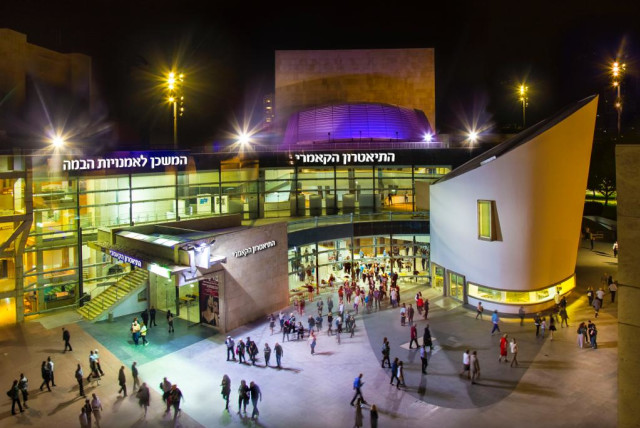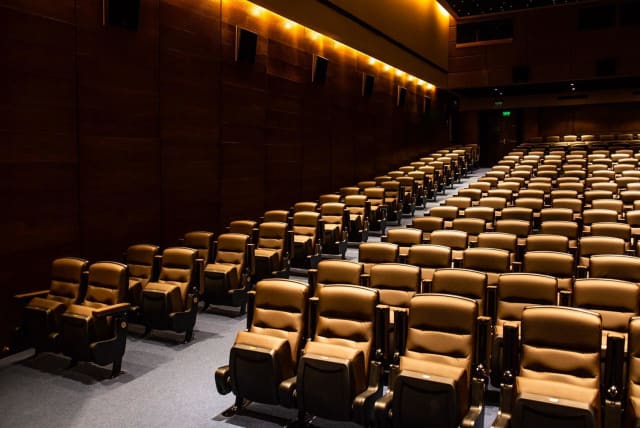Tony Kushner’s award-winning 1991 play, Angels in America, will be offered at the Cameri Theatre in a marathon performance next month. Set during the 1980s AIDS epidemic, the play follows nine unusual characters as they grapple with the tremendous fear HIV introduces into their lives.
The characters range from people who really existed, like Jewish-American attorney Roy Cohn, to fictional ones, like Joe Pitt. Pitt is a gay Mormon who abandons his spouse, Harper, during the play. The work includes mythical characters. A hermaphrodite angel delivers an important message in one key scene. The Bethesda angel, originally from Jerusalem, also appears.
Shown in two multi-hour parts, Millennium Approaches and Perestroika, the play offers a gamut of themes. These include Jewish-American history, US democracy, and the struggle of LGBT people toward acceptance. The historical Cohn, played in this production by Yoav Levi, was a closeted gay man who persecuted other gay men without mercy. Kushner stated that, in his play, Cohn and Pitt live a life of deception and betrayal.
“Like any good classic, Angels in America contains themes that vibrate differently at different times,” translator Eli Bijaoui told The Jerusalem Post. He added that when we watch a great theatrical work, “our hearts always go out to what is most relevant to us.”
Angels in America boasts a plethora of relevant themes
Kushner’s play had the good fortune of being adapted by HBO into a miniseries in 2003. It included Al Pacino as Cohn and Meryl Streep as a rabbi who quotes King Lear in Yiddish. Bijaoui points out that the iconic work for television still divides audience members today. Some view it as a nearly unbeatable adaptation, almost a standard all other productions should meet. Others find the filmed work a tad too much.
“Both groups will be in for a real surprise,” Bijaoui told the Post. “In this production, director Gilad Kimchi and composer Amir Lekner offer the audience original music, performed live by the Revolution Orchestra. The actors go through a seven-hour-long journey of falling to pieces and putting themselves back together again in front of your very eyes.”
For Bijaoui, this tribal gathering around a living tale, which takes shape in front of the audience, links this production to the deep human experience at the heart of theater.
While Millennium Approaches is performed in a large theater hall, with some distance between the stage and the audience, Perestroika is shown in a much smaller space. As patrons get closer to the characters on stage, they, too, become exposed. Those sitting in the front row during Perestroika are informed before the show begins that the rain drenching the actors on set will also fall on them.
For set designer Eran Atzmon, this added risk shows how much faith the Cameri Theatre had in the artistic merits of the production.
All that water required the installation of a brand-new draining system. The inclusion of the Revolution Orchestra, with its members acting in some parts of the performance, meant a better sound system had to be installed.
The production includes special effects such as fake rain-fall
“In Hebrew, the word for set, “taf’ura,” is connected to splendor, “pe’er,” Atzmon told the Post. “I like to create elusive sets.”
An audience member may not notice how quickly rainwater is collected off stage, or that the rails next to him are made from glass, but these gentle touches set the emotional tone for Perestroika.
Atzmon refers to these delicate details as “secrets” and plants them to offer the audience the delight of finding them out. An exhibition of his sketches for the two different sets is shown at the theater.
“A set does not deal with the representation of reality,” such as an actual New York street in the 1980s, Atzmon explained; “its focus is to tell a story. My main interest is in telling the truth. If you walk in truth, you will find others willing to go on that voyage with you.”
BIJAOUI POINTED to how, by retelling this very American work in Hebrew, more layers of meaning were added to it.
“Kushner uses biblical tales and presents Jewish destiny,” Bijaoui offered. “We are fine-tuning it so it can all be put back into Hebrew.”
Kushner’s Angels, with the lyrics “everywhere things are collapsing... systems of defense giving way” hits us differently after October 7. The rabbi’s character, during a eulogy, offers surviving family members to look to their forefathers for strength. This scene, spoken in Hebrew during a war, takes on an entirely new meaning.
‘Angels in America’ will be offered on Saturday, February 17. Millennium Approaches will be shown at 2 p.m. (three hours ), and Perestroika at 7:30 p.m. (three hours . Patrons are invited to attend a panel with Bijaoui, Kimchi, and others behind this performance at 6:30 p.m. Hebrew only. NIS 499 per ticket. 19 Shaul Hamelech Boulevard, Tel Aviv. Call (03) 606-0900 to book. IForbidden to take photographs during this production.







































































































